Financial Insights on Pet Bird Ownership
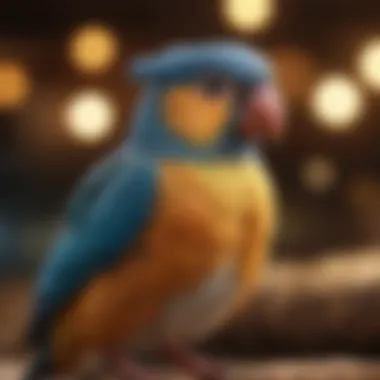
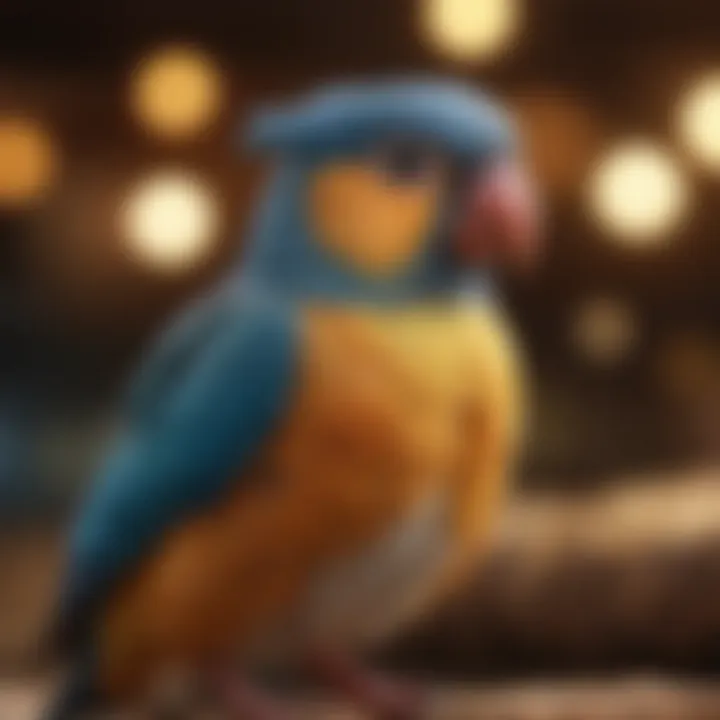
Intro
Owning a pet bird is akin to entering a world that dances to the rhythm of chirps, flaps, and the occasional playful squawk. However, before one rejoices in having a feathered companion, it’s paramount to understand the financial implications entwined with bird ownership. This journey is not just about the joys and cuteness; it’s a serious commitment that could impact your wallet significantly. From the vital outlays during acquisition to the continuous investment in care and well-being, each layer of expenditure can add up faster than a bird can flutter.
In the vast avian universe, each species comes with its own set of needs and costs. Thus, responsible ownership entails not just understanding but preparing for these commitments. This article delves into the monetary aspects of caring for a parakeet, a cockatoo, or perhaps a cockatiel, all while highlighting the responsibilities that lie beneath the surface of mere financial considerations. It sets the stage for aspiring pet bird owners to make informed decisions and ensure their feathered friends lead happy, healthy lives.
Avian Care Basics
Importance of Proper Nutrition
Nutrition plays a pivotal role in a bird's health and longevity. A well-balanced diet goes beyond just feeding seeds and is integral to the bird’s overall well-being. Birds require a mix of seeds, pellets, fruits, and vegetables. It’s essential to consult with a vet to determine a nutritional plan tailored to the specific species you have chosen.
- Fruits such as apples, berries, and oranges give vitamins.
- Vegetables like carrots, spinach, and broccoli are crucial for fiber.
- Pellets provide a balanced mix of nutrients.
For instance, while a budgerigar may thrive on a seed-based diet, a larger bird like an African Grey might need a more complex nutrient plan to thrive.
Understanding Bird Species and Their Needs
Not all birds are made equal. Each type of bird carries its unique traits, habits, and needs. For example, some birds crave attention, while others might be more independent. Getting a grasp of the specific needs can save not only money but also heartache.
- Small birds like finches typically have minimal space requirements but still need company.
- Medium birds such as conures require social interaction and might need larger cages.
- Large birds, including macaws, demand time, financial investment, and plenty of space.
Choosing the right bird for your lifestyle can prevent a financial pitfall later on.
Basics of Birds Habitat Setup
A comfortable habitat is non-negotiable for any pet bird. Setting up the cage may seem like a one-time expense, but it comes with ongoing costs.
- Quality Cage: The cage should be spacious enough for flying, ideally 24x24 inches for medium birds.
- Perches and Accessories: The right perches prevent foot problems, while toys provide enrichment.
- Bedding and Cleaning Supplies: Regular maintenance is key for a hygienic habitat.
The initial setup can turn into an investment that varies depending on the bird size and species.
Grooming and Hygiene Tips
Keeping a bird clean is part of responsible ownership. Regular grooming ensures your pet remains healthy and comfortable.
- Regular baths: Most birds enjoy a quick spray or bath, making it part of their routine.
- Nail trimming: Overgrown nails can be painful for birds while they perch.
- Feather care: Sometimes, a vet visit is necessary if there’s excessive molting or feather loss.
Building healthy habits from the start fosters a happy and thriving pet bird.
The costs of bird ownership are multi-faceted. From food to grooming, understanding these expenses upfront can prevent future financial stress.
End
Understanding the costs associated with pet birds is essential for responsible ownership. Each facet, from nutrition to habitat, plays an integral part in the financial equation. By preparing ahead of time, prospective bird owners can ensure that they not only provide for their avian companions but also enjoy the relationship for years to come.
Initial Acquisition Costs
Before diving into the joys and responsibilities of owning a pet bird, it's crucial to understand the initial acquisition costs. These expenses form the bedrock of your bird ownership journey and can range significantly based on various factors. Choosing a bird isn’t just a matter of following whims; it entails weighing costs against your long-term commitment to the avian companion. By grasping these costs upfront, you can better prepare yourself not just financially but also mentally for the journey ahead.
Choosing the Right Species
Choosing the right bird species is akin to picking a life partner. Each species has unique needs, characteristics, and care requirements. For instance, if you fancy a lively parakeet, you might be looking at lower initial costs than if you opt for an exotic macaw, which may come with a hefty price tag due to its rarity and specific needs.
- Popular choices like budgerigars and cockatiels might have a lower upfront price, but they have their own quirks that may require more attention and thus higher ongoing care costs.
- Alternatively, species like African Greys can offer a rich companionship but come at a premium, with their price reflective of their intelligence and longer lifespan.
In making this decision, research is invaluable. Pick a species that aligns with your lifestyle and financial capacity. Consider factors like space, noise tolerance, and time availability. It’s all fun and games until you face the consequences of a poor choice.
Purchasing from Breeders vs. Pet Stores
The decision to purchase your feathered friend from a breeder or a pet store can significantly influence your initial costs. Breeders typically charge more, but they often provide comprehensive information regarding the bird's health history and breeding conditions. Conversely, pet stores may offer lower prices, yet the quality and origin of the birds might be less transparent.
- Breeders might charge anywhere from a few hundred to several thousand dollars, depending on the species and its pedigree. However, reputable breeders often ensure the birds are bred under ethical conditions and are often healthier.
- Pet stores present a mixed bag; prices can be lower but carry risks associated with the bird’s health and background.
The decision doesn't solely hinge on cost. Think about the longevity of your pet and the potential pitfalls that could arise from a rushed purchase. Take your time, get informed, and remember, what’s cheap now might cost a bundle later.
Adoption Fees from Rescue Organizations
Adopting from a rescue organization is a noble route that also tends to be lighter on the wallet. Generally, the fees are much lower than purchasing from breeders or pet stores, and you're provided with the additional comforting aspect of giving a needy bird a forever home.
- Expected adoption fees can vary but often lie between $50 to $150. This usually includes vaccinations, some health checks, and essential paperwork.
- Many organizations also provide new owners with resources to help transition the bird into its new home, which can save you future headaches.
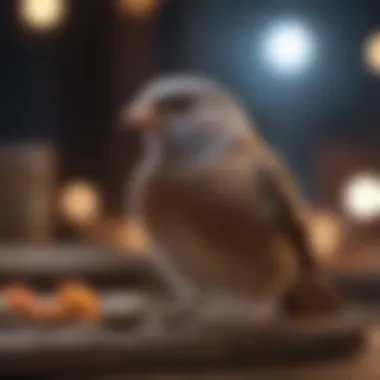
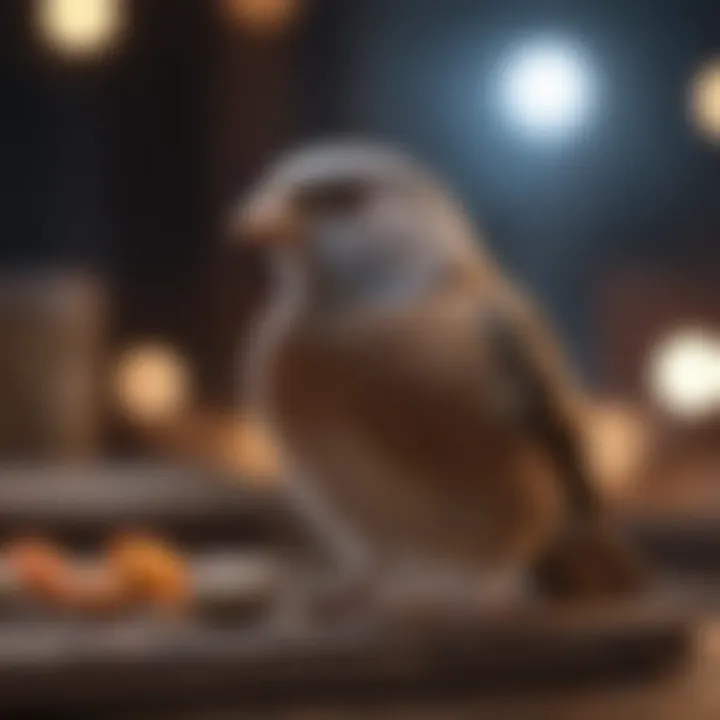
It's crucial to ensure you adopt from an organization that prioritizes the well-being of the animals. By opting for adoption, not only do you save money, but you also gain a sense of fulfillment from helping a bird in need.
Cost Variations Among Different Bird Species
The costs associated with acquiring a pet bird can drastically fluctuate across species. While it may be tempting to focus on purchase price, consider the comprehensive picture. Some birds may seem inexpensive initially but require specialized care that can accumulate costs in the long run.
- Smaller species like finches or canaries may offer a quick entry point into avian care, often priced anywhere from $25 to $100. Yet, initial expenditures are often complemented with lower care costs.
- Conversely, larger species such as Amazons or cockatoos, generally ranging from $500 to $2,500 or even higher, could provide a thrilling experience but come with complex needs, impacting not just the initial cost but also your budget over time.
Thus, while pondering the costs, keep in mind the lifespan and care requirements, enabling you to make a more rounded and informed decision.
"Owning a pet bird isn’t just a financial transaction; it’s a commitment that requires serious thought and responsibility. "
With these initial considerations laid out, prospective owners are better equipped to navigate the often murky waters of bird ownership. Whether making a modest financial investment or preparing for a larger undertaking, remember that the early choices you make set the stage for your journey with your feathery companion.
Habitat Setup Expenses
When considering the costs of owning a pet bird, the habitat setup expenses play a crucial role. A bird’s living environment directly affects its physical and mental well-being, making it essential to invest in a comfortable and safe space. Many first-time bird owners might think a simple cage will suffice, but the reality is much more complex. This section explores various aspects of habitat setup, highlighting both essential elements and considerations that can impact long-term expenses.
Selecting an Appropriate Cage
Choosing the right cage for your bird involves more than picking the prettiest option in the store. The size and design of the cage can significantly influence your pet’s quality of life. A general rule of thumb is to pick a cage at least twice the wingspan of your bird in width and height. A spacious cage allows birds to stretch their wings and move freely, reducing stress and promoting health.
Cage materials also matter. Opt for a sturdy cage made of non-toxic substances that resist rusting and peeling. Avoid those with narrow spaces between bars; tiny feet can get stuck, leading to potential injuries. Besides, consider the ease of cleaning since a filthy cage is a breeding ground for unpleasant smells and health risks.
Essential Accessories for Comfort
Perches and Toys
Birds need stimulation just like kids do. Perches should mimic their natural environment. Natural wood perches are a popular choice as they come in various diameters to help keep your bird’s feet healthy. Offering multiple perches of different textures can prevent foot problems and keep them entertained. For toys, think about those that promote mental exercise, such as puzzles or wood chews. The right toys not only keep boredom at bay but also encourage natural behaviors, keeping your avian friend engaged.
Key Characteristics:
- Natural texture and variety promote healthy feet and encourage play.
- Bright colors and sounds attract attention and keep birds active.
Advantages:
- Enhances your bird’s well-being and happiness.
- Prevents destructive behaviors due to boredom.
Food and Water Dishes
Feeding dishes should be sturdy and easy to clean. Material matters; many owners prefer stainless steel or ceramic dishes because they hold up better against wear and tear compared to plastic. Such materials are less susceptible to bacterial growth, which is critical to your bird’s health.
It's also wise to make sure these dishes are appropriately sized. A shallow dish might work for a small bird, while a larger breed will need more space to eat comfortably. Keeping the food and water accessible helps maintain a healthy diet, which is a substantial part of overall bird care.
Key Characteristics:
- Durable structures help prevent spills and mess.
- Easy to sanitize backs up good hygiene practices for your feathered friend.
Advantages:
- Reduces the risk of contamination.
- Makes regular cleaning a hassle-free task.
Substrates and Liners
Choosing substrates can be tricky, but the aim is to keep everything clean and hygienic. Options like paper towels or newspapers are often preferred because they're affordable and easy to change. Some owners opt for specialized liners or sandy bedding, claiming it provides better comfort.
It’s essential to ensure that whatever substrate you choose is non-toxic. Some products might contain harmful pesticides or fragrances that can be detrimental to your bird’s health. Also, consider how often you’ll need to clean the cage; substrates that hide waste may lead to more cleaning woes down the road.
Key Characteristics:
- Non-toxic and absorbent materials are paramount for health.
- Easy-to-replace options minimize hassle.
Advantages:
- Overall cleaner living space promotes well-being.
- Non-toxic options reduce risks of illness.
Considerations for Cage Location
Location doesn’t play as simple a role as you'd think. The placement of the cage needs careful consideration for not just aesthetics but safety and comfort as well. Avoid spots that are too drafty or receive direct sunlight for long periods, as these conditions can impact your bird’s health.
Another factor is social interaction. Birds are social creatures; they thrive on the company of their owners. Ideally, the cage should be placed where the bird can see and interact with the family without feeling isolated. An ideal spot also promotes engagement and decreases stress, making for a happy bird.
In summary, creating a comfortable and engaging habitat for your pet bird is not only about the financial investment but also about the time and effort you’re willing to dedicate. By carefully weighing these considerations, any future bird owner will set a firm foundation for a positive and rewarding avian companionship.
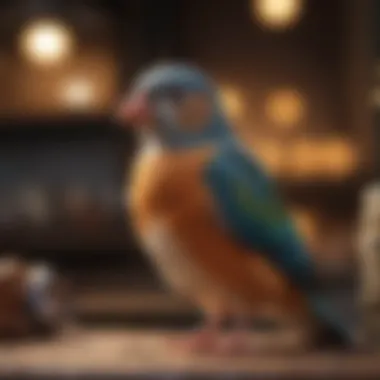

Monthly Care Expenses
When contemplating the journey of pet bird ownership, understanding monthly care expenses is crucial. This ongoing financial commitment goes beyond the initial costs of acquisition and habitat setup. Failing to delve into these regular expenses can lead to surprising financial strains down the line, and it further emphasizes responsibility toward your feathery companions. Whether it's food, grooming, or veterinary care, each element plays a part in ensuring the well-being of your bird while also affecting your purse strings.
Nutritional Requirements and Costs
Seed vs. Pellet Diets
One of the first considerations in caring for a pet bird is nutrition, which brings us to the age-old debate: seed versus pellet diets. Seeds are often favored for their variety, including sunflower seeds and millet, and they can entice even the pickiest eaters. However, solely relying on seeds isn't the wisest choice. Many birds can end up with nutritional imbalances because seeds tend to be high in fat and lack essential vitamins and minerals.
On the other hand, pellet diets offer a balanced nutritional profile. They are formulated to meet the dietary needs of birds and can prevent the tendency to pick and choose favorite seeds, leading to a more well-rounded diet. But, pellets can be a bit pricier and may not be as readily accepted by all birds initially. The challenge often lies in transitioning your pet to pellets, as some may be reluctant to make the change. It's essential to weigh the benefits of a nutritionally complete diet against the initial transition hurdles.
Fresh Fruits and Vegetables
Fresh fruits and vegetables are an invaluable part of a comprehensive bird diet. They provide important vitamins, minerals, and hydration, which are sometimes lacking in seed or pellet diets. Options like kale, carrots, apples, and bananas can be appealing to your bird while contributing positively to their health.
The unique feature of fresh produce is that it can be tailored to the specific tastes of your bird, making it not just healthy, but also enjoyable for them. However, introducing new foods can often be a trial-and-error process. Some birds might take to certain fruits or vegetables, while others might turn their beaks up at them. Plus, unlike seeds or pellets, fresh produce has a shorter shelf life, which could lead to wastage if your bird doesn't take to it immediately. So, be prepared for fluctuations in freshness and associated costs.
Supplements and Treats
Adding supplements and treats into your bird’s diet can enhance their nutrition and overall enjoyment. Whether it's a calcium block or a special fruit treat, these extras can play an important role in a balanced diet. For instance, calcium is often crucial, especially for female birds, supporting healthy bone structure and egg production.
However, knowing when and how much to give can sometimes be tricky. Overdoing treats can lead to obesity and other health issues. Furthermore, some birds may become overly reliant on treats, refusing to eat their everyday food. Thus, while it may add some fun variety to their routine, careful moderation is key.
Grooming and Hygiene Essentials
Bathing and Feather Care
Birds need to be kept clean, and that involves bathing and feather care. Regular bathing helps maintain feather quality and promotes healthy skin. Depending on the species, some birds may bathe themselves willingly, while others require gentle showers. This process can help prevent feather plucking and skin irritation, both of which can lead to serious health issues if left unattended.
However, birds’ safety during bathing must be considered; they are sensitive creatures and can easily be stressed. Making sure the water is at the right temperature and avoiding any soap or shampoo can be crucial. It can take some time for birds to adjust to a bathing routine, which could require patience and persistence from the owner.
Nail Trimming Tools
Nail trimming tools are another necessity that can’t be overlooked. Long nails can cause discomfort, trouble perching and can lead to potential injuries. Having the right tools, like bird nail clippers, is essential for this task.
However, clipping nails can be intimidating for a new bird owner. If not done correctly, it can be stressful for you and your bird. Some birds resist nail cutting, making it a challenge to maintain their paws. Investing time in training and using the right tools can make nail care easier in the long run, but it's a task that requires diligence and care.
Cleaning Supplies
Keeping your bird’s habitat clean is fundamental for their health, necessitating various cleaning supplies. Bird droppings, food remnants, and feathers can dirty their living space quickly, creating not only an unpleasant odor but also a potential health hazard.
Basic cleaning supplies include mild, bird-safe disinfectants, sponges, and other essentials. Now, while it may seem simple, having a consistent cleaning routine is paramount. Maintenance costs can add up if cleaning supplies are frequently replenished or if extensive cleaning is often required due to neglect. Additionally, ensuring that cleaning products are safe for birds requires careful consideration, as many household cleaners can be harmful.
Veterinary Care and Health Management
Routine Check-Ups
A bird’s health should never be taken lightly, making routine check-ups with an avian vet essential. Just like any pet, birds can harbor hidden health issues that may not be immediately apparent. Regular visits can help spot problems early and ensure your feathered friend stays healthy and thriving.
This might translate into costs for check-ups that can vary by location and the vet's experience. But savvy bird owners view these visits as crucial investments in their bird's long-term wellbeing and peace of mind.
Vaccinations and Medications
Vaccinations and medications play a significant role in maintaining your bird's health. Protecting against diseases such as psittacosis or canker through vaccinations is fundamental, especially if you acquire a bird from a store or breeder. Additionally, knowing how to manage common ailments can save considerable costs and stress in the long run.
While this may be an additional monthly expense for some, remember that it also includes the emotional aspect of ensuring your bird is safe from preventable diseases. It's well worth factoring these costs into your overall budgeting for bird ownership.
Emergency Care Costs
Lastly, emergency care costs can be a wild card. Accidents can happen, and illness can strike unexpectedly; the financial burden of emergency vet visits can be daunting. Depending on the situation, these costs can vary widely, with some circumstances demanding immediate attention. Having to budget for these expenses, even if they occur infrequently, is essential.
In the event of an emergency, fast action is crucial, but well-informed bird owners also recognize that costs can escalate quick. It’s smart to set aside a rainy day fund specifically for such unexpected health issues, which can mitigate financial stress when it matters most.
Potential Additional Expenses
Owning a pet bird can bring unparalleled joy, but it also requires a level of financial prudence that many prospective bird owners might overlook. The term "additional expenses" encompasses those costs that aren't immediately apparent when one first commits to bird ownership. Understanding these variables enables enthusiasts to properly prepare. Not only can surprises turn finances topsy-turvy, but they can also affect the bird's welfare if left unaccounted for. Here’s a closer look at some key areas that can affect your wallet in more ways than you might expect.
Travel and Boarding Considerations
Life is unpredictable, and sometimes it forces us to travel. Whether it’s a quick business trip or a family vacation, figuring out what to do with your feathered friend can be a puzzle. Birds, unlike dogs, can’t tag along easily when you decide to hit the road or catch a flight. Therefore, you'll likely face one of two options.
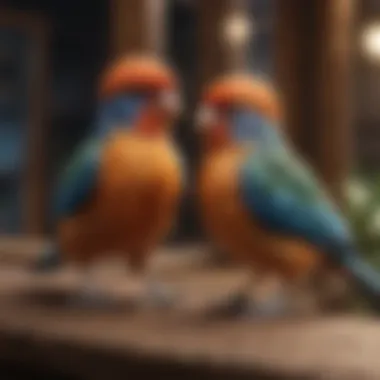
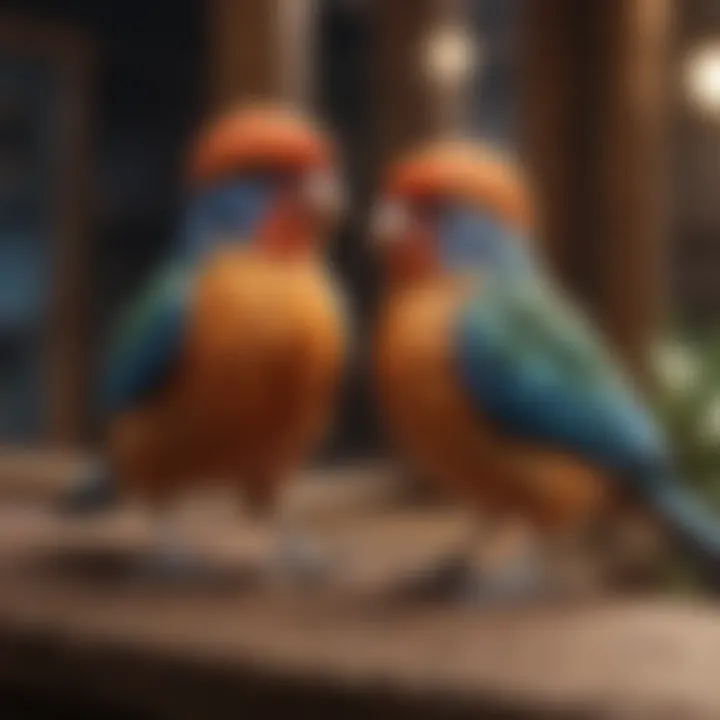
- Pet Boarding Services: Some facilities specialize in taking care of birds, but they come at a premium. Charges often depend on the species, size of the bird, and length of stay. For instance, a simple weekend might set you back $50-100, while longer visits can quickly escalate into several hundreds.
- In-Home Care: Alternatively, you can hire a professional pet sitter who is experienced in handling bird care, while the added convenience of care in the bird’s own environment can help reduce stress on your avian companion. However, expert sitters aren't typically cheap. Expect charges similar to, or even higher than, boarding facilities.
Accommodating Personality and Behavioral Needs
Every bird has its quirks and personality traits. Some are more sociable, while others may feel anxious when near new environments or stimuli. To ensure a healthy relationship between you and your pet, you might find it beneficial to invest in potential resources that could lessen behavioral issues.
Training Classes
Training classes can be a great way to ensure that your bird grows into a well-behaved companion. Whether teaching basic commands or addressing specific behavioral issues, these classes provide much-needed structure. The structured nature of training helps birds understand boundaries and social cues, making them less stressed and more adaptable.
One appealing characteristic of training classes is the community aspect. You may get to meet other bird owners and share tips or experiences. It also helps your pet to socialize with others, which can greatly reduce anxiety. However, it's important to be cautious as not all instructors are created equal, so choosing someone experienced can make a world of difference.
"Well-behaved birds not only enrich our lives but also tend to be more content, making training a smart long-term investment."
Behavioral Consultation
When pet birds exhibit persistent issues, you may need to consult a professional for behavioral advice. Behavioral consultations can help decode the actions and responses of your bird, offering strategies that align with its individual needs. Understanding stressors is vital, and experts can interpret behaviors that may not be instantly clear.
One of the key advantages is the tailored support each bird can receive during these consultations. The process often includes personalized behavioral assessments, which can lead to actionable solutions. However, it’s worth noting that the costs for such consultations can pile up, with fees varying widely depending on the level of expertise needed.
Unexpected Medical Emergencies
As with any pet, birds are prone to ailments that may catch owners off guard. It’s not uncommon to require sudden veterinary care, and these medical emergencies can come with hefty bills. Unlike cats or dogs, birds often require specialized care from avian veterinarians, which can further inflate costs.
Regular vet check-ups can mitigate some risks. However, being prepared for the unforeseen is crucial. Having a fund dedicated to medical emergencies can help ease the financial burden should that time come. Planning for these excess expenses ensures you are never unprepared, paving the way for a healthier bond with your pet.
Long-Term Financial Commitment
Owning a pet bird involves far more than just feeding it and keeping its cage clean. Every feathered companion needs a lifetime of care, companionship, and, yes, financial investment. This section tackles the intricacies of this long-term financial commitment—an aspect that's often glossed over by those new to avian ownership. Without understanding these responsibilities, one may find themselves in a tight spot down the line.
Living with a bird can offer joy and companionship, but it also means committing to the long haul. With a lifespan that can span decades—some species even reaching over fifty years—these initial decisions weigh heavily on the future. The bond formed with your feathered friend is not just about the joy it brings, but also the consistent dedication needed to ensure its health and happiness. Here are the main components to consider:
- Routine Expenses: These include the costs associated with food, regular vet visits, and grooming supplies. The average expenses can reach hundreds of dollars annually, making it essential to budget accordingly.
- Unexpected Costs: Life is unpredictable. Medical emergencies, sudden behavioral changes, or the need for specialized care can rear their heads, significantly impacting financial plans.
- Retirement Plans: Like any long-term responsibility, it's valuable to consider how your changing lifestyle or retiring might affect your bird’s needs. Birds may require specific adjustments in their environment or care as you age.
"A bird's needs don't just vanish with the years; they evolve, and so do your financial commitments towards them."
Understanding the long-term implications of bird ownership is crucial for maintaining a stable life for your pet and yourself.
Lifetime Costs of Bird Ownership
The financial outlay for a pet bird stretches well beyond the initial purchase price. When considering the lifetime costs, prospective owners should keep an eye on several key areas:
- Cage and Habitat Costs: The cage is usually the largest upfront expense, but ensure you account for its replacement or upgrades over time. Birds may outgrow their spaces or require new features as they age.
- Nourishment and Treats: It's essential to keep birds healthy with a balanced diet. Fresh fruits, vegetables, and specialized pellets can add up. A varied diet not only promotes better health but also happiness. Monthly nutritional costs should not be underestimated.
- Veterinary Care: Routine check-ups, vaccinations, and emergency treatments can quickly surge into the thousands. When budgeting, it is wise to allocate funds for unexpected health issues which may arise due to age or unforeseen incidents.
- Accessories and Maintenance: Perches, toys, and even cleaning supplies are ongoing costs. As birds often play with and wear out their toys, these recurring expenses are essential for their mental and physical health.
- On a more personal note, consider the emotional and time investment too. Nurturing a bird is a full-time job, which can indirectly contribute to costs if special arrangements need to be made when life changes occur.
Planning for Changes in Lifestyle and Finances
Think of life as a river, constantly changing currents. As your circumstances shift, so too will the care requirements for your feathered companion. Planning for such transitions is crucial. Here are points to consider:
- Job Changes: If you're anticipating a career change, factor in how this might affect your ability to care for your bird. Shifting to a job that requires travel or longer hours can complicate routines.
- Family Dynamics: Family growth or changes can impact your bird's environment. More people in the house may mean additional stresses for the bird or changes in how you manage its care.
- Health Issues: As we age, health considerations become more pressing. Ensure you can still meet your bird's needs if you face health challenges. This may require additional financial resources or support.
- Reevaluation of Spending: Budgeting is not static. Regularly reevaluating your finances in relation to bird ownership helps avoid unpleasant surprises. It’s also wise to keep an emergency fund specifically for your bird’s unforeseen needs.
Ultimately, being proactive about potential scenarios and adjustments can make all the difference. Owning a bird is not just a pastime but a lasting partnership, requiring careful planning and commitment.
End
As we wrap up this exploration into the costs of owning a pet bird, it's imperative to grasp the significance of your financial responsibilities throughout this journey. Bringing a feathered companion into your life isn’t just about the delight they bring; it’s also about the monetary and emotional commitments that must be diligently managed. Understanding these financial intricacies enables potential bird owners to approach their decision with both caution and excitement.
Summarizing Financial Responsibilities
The financial obligations of bird ownership extend far beyond the initial acquisition costs. From habitat setup and monthly care expenses to potential unexpected expenditures, almost every aspect requires thorough budgeting and foresight. Here are some of the primary responsibilities that you should consider:
- Initial Setup: This includes selecting an appropriate cage and purchasing essential accessories.
- Ongoing Care: Monthly costs can pile up quickly through food, hygiene products, and vet visits.
- Potential Emergencies: Always factor in veterinary care for unexpected health issues. This can be a serious consideration if your bird experiences sudden illness or requires special treatment.
In totality, the financial landscape is multifaceted. Understanding this breadth is key to a successful ownership experience. This isn't just about finances; it’s about ensuring a healthy and thriving environment for your avian friend.
Making Informed Decisions About Bird Ownership
Now more than ever, potential bird owners have access to a trove of resources. Just a quick scroll through forums on Reddit or a glance at dedicated groups on Facebook can provide real-world perspectives and invaluable advice.
When deliberating on whether to get a pet bird, take some time to self-reflect on these essential questions:
- What can I realistically afford each month? Don't forget the hidden costs—these often catch new owners off guard.
- Am I prepared for the long-term commitment? Remember, many bird species can live for decades.
- How will my lifestyle changes affect my bird? As circumstances shift, you should reassess your ability to care for your pet.
Informed decision-making begins with understanding the financial implications. Research, discuss, and plan your budget carefully before leaping into pet bird ownership. By being mindful and thorough, you will not only secure your financial footing but also pave a prosperous path for a rewarding relationship with your charming new companion.
"Planning is bringing the future into the present so that you can do something about it now." - Alan Lakein
Knowing the costs allows you to focus on what truly matters: the companionship and joy your pet bird will bring to your life.















